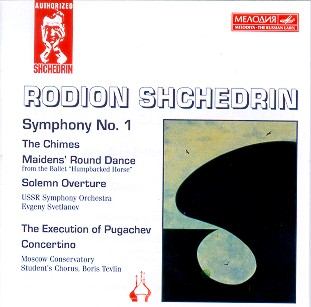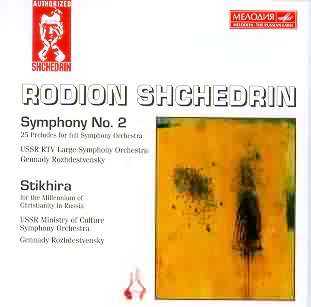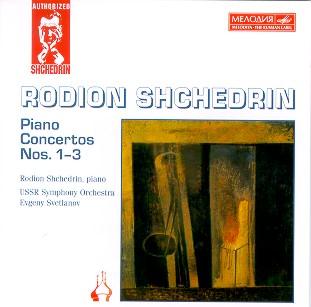
|
1.
Symphony No. 1 (1958)
2. Concerto No. 2 for full orchestra
The Chimes (1968) 3. Maidens' Round
Dance from 'The Humpbacked Horse' (1956)
4. Solemn Overture (1982)
5. The Execution of Pugachov
(1981) 6. Concertino
(1982) 1-4
USSRSO/Evgeny Svetlanov 5-6 Moscow
Conservatory Students' Chorus/Boris Tevlin 6 Boys'
Choir Moscow Chorus College/Lev Kantorovic recorded 1-2, 5
May 1975 Moscow Conservatory; 3-4 Moscow 1987; 5-6 Moscow 18 October
1983 1-4
USSRSO/Evgeny Svetlanov 5-6 Moscow
Conservatory Students' Chorus/Boris Tevlin 6 Boys'
Choir Moscow Chorus College/Lev Kantorovic recorded 1-2, 5
May 1975 Moscow Conservatory; 3-4 Moscow 1987; 5-6 Moscow 18 October
1983 BMG Melodiya
74321 60121 2 [71:14] BMG Melodiya
74321 60121 2 [71:14] |
 |
| |
Crotchet |
Shchedrin's international reputation was founded on the success of his
arrangement of Bizet's music for Carmen as a 40 minute ballet (1967).
The style is supercharged and the orchestra is made up of a massed body of
virtuoso strings with a generous percussion section. Since this was first
recorded by Rozhdestvensky for Melodiya it has been repeated by other Western
orchestras. The ballet was written for his wife, the ballerina Maya Plisetskaya.
He also wrote for her The Hump-Backed Horse (1960), Anna Karenina
(1972 after Tolstoy), The Seagull (1980 after Chekhov) and The
Lady With the Lapdog (1985 after Chekhov). Including the two operas Not
Love Alone (1961 rev 1972 after Sergei Antonov) and Dead Souls
(1977 after Gogol - recorded as part of BMG's Russian Opera series) this
makes seven of his works which have been premiered at the Bolshoi.
His latest opera is Lolita (after Vladimir Nabokov) which was premiered
in Stockholm conducted by Mstislav Rostropovich.
Shchedrin is a Muscovite by birth, born into religious family. His grandfather
was a priest. Rodion's father was a composer and a professional violinist.
Rodion attended the Moscow Conservatory where he studied with Yuri Shaporin
(now there's another composer whose music I would like to hear - wasn't there
a cantata recorded once - something about the defence of the Russian homeland?)
and pianist Yakov Flier. From 1973 to 1990 he was chairman of the Russian
Union of Composers founded by Shostakovich. This union was a counterpoise
to the other union which was effectively the 'house' union for Soviet composers.
The Symphony No. 1 is a glowingly accomplished work of his student years.
It opens with a heartbeat rhythm on cymbals. The first movement is dark and
sour-toned, modernish but basically tonal. It presents far less of a listening
challenge than, say, Hartmann or Frankel. There is a loftienss about the
music which suggests a Symphony of the stratosphere. The occasional chesty
cough indicates a concert performance. The pessimism is offset by a recurrent
theme which sounds like a phrase from Lehár's 'You are My Heart's
Delight'. There is a touch of Sibelius 5 in the magnificently blaring horn
section. Beefy sound throughout and a gem of a finale - a confidently unleashed,
gloriously sustained long melody which grows in stature with every pace it
takes. The work ends with a reminiscence of the 'Lehár' tune. If you
were looking for a British counterpart for this wonderful work then think
about Malcolm Arnold's fifth symphony. Well worth exploring.
The Chimes is his Second Concerto for full orchestra. It was written
for, commissioned and premiered by Leonard Bernstein with the New York PO.
It's a work not merely of 1960s modernistic tendencies but of complete commitment
to modernism. It is a work of cacophonous noise or chasmal silence. It cackles,
snaps, slams and barks, howls and shouts like the very best Penderecki or
Ligeti of the 1960s or 1970s. It is deeply unappealing to my ears. This is
a concert performance complete with some coughing but no applause (presumably
edited out).
The Maiden's Round Dance is a quiet and tender brief pavane. One can
almost see the corps de ballet in circles of six dancing elegantly in small
circles. This and the somewhat vapid clamorous Solemn Overture
(obviously an occasional piece written in an accessible style) contrast
with the exuberant avant-garde techniques of The Chimes.
The two choral pieces each play for about ten minutes. The first is a varied
and enjoyable piece (taken purely as sound) much shaped by Russian Orthodox
chants. The grim text (describing an execution) is set out in full in the
booklet. The four movement Concertino is a work of similar attractions. I
caught myself several times thinking of the Swingle Singers recordings from
1979 of French and British choral pieces. The singing is precise and powerful
and the final movement bell evocations are memorable and the 'jet take off'
finale is a testament to the power and virtuosity of this choir.
If you cannot run to all three discs do buy this one.
tar.gif)

|
Symphony No. 2 25 Preludes for full symphony
orchestra * Stikhira (1987) **
 USSR RTV Large
SO/Gennadi Rozhdestvensky * USSR Ministry of Culture SO/Gennadi Rozhdestvensky
** recorded Moscow * 1965 ** 1989 USSR RTV Large
SO/Gennadi Rozhdestvensky * USSR Ministry of Culture SO/Gennadi Rozhdestvensky
** recorded Moscow * 1965 ** 1989
 BMG Melodiya 74321 60122 2 [77:15]
BMG Melodiya 74321 60122 2 [77:15] |
 |
| |
Crotchet |
The 55 minute symphony is a determinedly modernistic work with a Bergian
approach to lyricism blended with a typically Russian style of clamant brass
writing in moments of high climax. The structure is unusual and comprises,
as the title suggests, 25 preludes. The notes point out that that many of
these begin before the previous prelude has finished.
The work is banded into five tracks. Each track offers a group of preludes.
Preludes 1-6 explore the extremes of the dynamic range but the impression
left is somewhat arid and washed out. The second sequence (7-9) is difficult
and opens with an episode which sounds genuinely like tuning up though fragments
of themes do emerge from the chaos. The Third movement (preludes 10-14) has
dynamism and is more approachable with the sounds of flocks of birds at 10.30
and becomes assertively tuneful. Track 4 (preludes 15-18) opens with a high
whistle and warbling old-style horns. This is very haunting, superimposing
Sibelian rustling strings over a flute bleakly calling and the french horn's
watery warbling. The strings turn and revolve in a way similar to observing
a hurricane from high above the earth. Track 5 at 5:20 has Chopin-lke pianistic
moments alternating with with crashing chords. The work ends in echoing peace
and shrieks from the horns finally resolving into long-held chords and the
tinkle of the triangle piacevole.
A Stikhira is a religious poem set to music. This 25-minute 1987 piece has
a soul relationship to Arvo Pärt's Cantus but rises to more
passionate heights while at all times remaining rooted in the clouds of Orthodox
chant. The piece is relatively easy to come to appreciate. It also features
the breathiest flute playing I have ever heard (presumably notated as such
in the score?). Bell tolling meets brass choirs calling out in Scriabinesque
turmoil. There is even a touch of Hovhaness. The vacant hand-stilled bell
noises at 18:00 add a pre-historic aura to a strange and mersmerising work.
In my copy of the disc there were two momentary breaks in the recording within
the first five minutes of the piece.
As you will have noticed these two works are conducted by Rozhdestvensky,
a man who during his all too brief tenure of the BBC Symphony Orchestra during
the 1980s injected unpredictability into the repertoire (his Delius Song
of the High Hills and Lokshin Symphony No 3 Kipling settings were highlights)
and the performance style. The look of innocent joy in his eyes during a
TV relay of Prokofiev's Chout spoke volumes for his priorities in
music - a commitment to communication, born of his own absorbed unself-conscious
pleasure in music and its sharing.
For many years there was a rift between the composer and the conductor. There
are signs that this rift may be healed. I hope so.


|
Piano Concerto No. 1 (1954) 23:16
Piano Concerto No. 2 (1966) 22:56 Piano Concerto No.
3 Variations and Theme (1973) 21:39
 Rodion Shchedrin
(piano) USSRSO/Evgeny Svetlanov Recorded live 5 May 1974, Grand Hall, Moscow
Conservatoire Rodion Shchedrin
(piano) USSRSO/Evgeny Svetlanov Recorded live 5 May 1974, Grand Hall, Moscow
Conservatoire  BMG Melodiya 74321 36907-2 [68:06]
BMG Melodiya 74321 36907-2 [68:06] |
 |
| |
Crotchet |
The present disc is taken from a landmark concert in Shchedrin's career.
At this concert, later repeated in Leningrad and Kiev, he played all three
concertos in sequence with brief interval between each. Three concertos ,of
which the first is very accessible in a fresh-minted
'Rachmaninov-meets-Shostakovich' way. The other two are tougher meat and
though alive with vitality and experiment are difficult nuts to crack. The
first movement of No. 1 is wave-crashingly romantic, the second playful,
the third moody like one of Bax's or Medtner's dark works for solo piano.
The last movement is playful, a Gershwin-Rumba cocktail.
It is interesting that the composer seems almost apologetic about the first
concerto the orchestral part of which he revised for this 1970s concert.
The other two are as written in 1966 and 1971. They are atonal and, in the
case of the third concerto, apparently use aleatory technique. The second
and third were written against the tide of the times. That tide was not just
a matter of fashion but one of dogma and political threat. The second emerged
in the years when the Union of Soviet Composers condemned 12-tone music as
an ideological problem rather than a legitimate choice available to composers.
Shchedrin spoke out openly against the majority view at some risk to himself.
Despite this the concerto was premiered by the composer with the Moscow RSO,
Gennadi Rozhdestvensky conducting. Onik Sarkisov of Mravinsky's Leningrad
PO was in the audience and, smitten with the work, it went with its composer
as soloist on a world tour which took in Paris, Lyons, Geneva, Berne and
Milan.
This international element has remained important. Shchedrin now divides
his time between Moscow and Munich. In 1976 he became a corresponding member
of the Bavarian Academy of Fine Arts. The second concerto is densely atonal
but interest is kept alive by some explosive and seethingly active textures.
There is a splash of jazz in the last movement over which Shostakovich-like
elements roll like a tank. The jazz re-emerges with moments of Lionel Hampton
sophistication. The ticking of the celestial clockwork clicks away. The three
movements of the concerto are Dialogues, Improvisations and
Contrasts. The work should not be forgotten by anyone compiling a
programme celebrating 'jazz-meets classical'.
The Third concerto, which opens with bird shrieks, is an eighteen-minute
set of variations with the theme announced after the variations in a three-minute
sequence. The theme is a reference to the Diabelli Variations. After the
cataclysmic howls, shrieks, mutterings and hammerings of the variations the
theme emerges as the composer says 'like a broken vase' to form a unified
whole from the whirling fragments of the preceding 18 minutes. Metallic
'whiplashes' close the work.
Applause is included after each of the three concertos. Otherwise the audience
are, surprisingly, very quiet indeed.
Sound quality excellent. Notes by the composer are full and authoritative.
They do not suffer from the usual problems of composer notes of being either
too technical or taciturn. Sigrid Neef's additional background notes are
excellent.
With the exception of the first concerto which is a pleasing and fresh work
well worth hearing and bidding fair to partner Shostakovich's second piano
concerto this disc did not tempt me to return.
 |
|
|
 |
(for first piano concerto) |
|
OVERVIEW
There are many more discs in the BMG Shchedrin authorized series and I hope
to review others in due course. The 12-tone works leave me rather cold. The
earlier works such as the first symphony and the first piano concerto are
a different matter and I urge you to hear them. What a strange reversal.
The freedom of the West during the 1960s and 1970s must have made the aleatory,
atonal and 12 tone trends a 'forbidden fruit' attraction for the Russian
composers. By the time they had secured some liberation and freedom from
real threat the West had begun to cant back towards neo-romanticism of which
minimalism is an aspect and which has bloomed in many more complex directions
since then. Like all fashions and tastes things will change again.
As for Shchedrin, I feel convinced of his sincerity in writing music like
the second symphony and the second and third piano concertos (there is a
4th now). It is my loss that I find much of them unyieldingly impregnable
when it comes to delivering any enjoyment. Others will warm to them and they
have been greeted with acclaim in many other quarters.
Reviewer
Rob Barnett
|

Review of three of the BMG-Melodiya Authorized Shchedrin' CDs
Two Symphonies and Three Piano Concertos Melodist of the 1950s; the Avant-Garde of the 1960s and 1970s.
